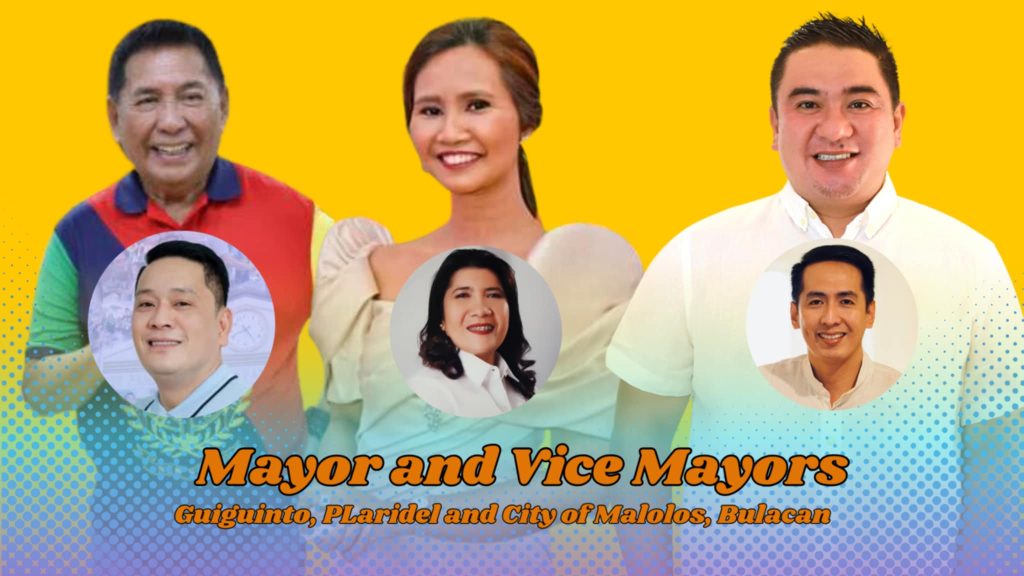
The 2025 midterm elections marked a defining shift in the political landscape of the Philippines. Voters have become more critical, moving away from bloc voting and focusing instead on the individual capabilities, performance, and credibility of each candidate. This wave of informed decision-making signals a deeper political maturity and public demand for leadership that delivers results, not just promises.
In Guiguinto, Mayor Ambrosio “Boy” Cruz returned to power unopposed, a clear testament to his enduring trust and influence in the community. After serving three successful terms as mayor and becoming the first congressman of the 5th District, his dream to elevate Guiguinto to city status continues to resonate. Under his leadership, the municipality experienced strong economic gains, increased investments, and visible urban development.
Likewise in Malolos, Mayor Atty. Christian Natividad of One Malolos secured another term, despite past political challenges. And in Plaridel, Mayor Jocell Aimee Vistan maintained her leadership amid evolving alliances and public expectations.
These mayors remained undeniably strong winners not just because of their political machinery, but because they have performed exceptionally and remained largely unrivaled in governance and results.
Interestingly, all three municipalities—Guiguinto, Malolos, and Plaridel—share a common thread: their vice mayors are former challengers to the sitting mayors. In Guiguinto, Vice Mayor Eliseo “JJ” Santos, who once contested the mayoralty in 2022, made a remarkable comeback via landslide victory. His leadership during the pandemic and his consistent presence in grassroots efforts helped rekindle voter trust.
In Malolos, Vice Mayor Bebong Gatchalian, who ran against Mayor Natividad in 2022, is now back as his second-in-command. And in Plaridel, Vice Mayor Mhel de Leon, also a past rival of Mayor Vistan, is now tasked to preside over the Sangguniang Bayan.
Whether this configuration is part of a calculated political strategy or simply a redemptive opportunity for former rivals to demonstrate loyalty and commitment to public service, one thing is clear: the people expect these leaders to move past personal history and focus on results. Voters are watching—and expecting maturity, collaboration, and improved service delivery.
Despite this renewed energy in local politics, the country still faces deep-rooted challenges—particularly in education. According to the 2022 PISA (Programme for International Student Assessment), the Philippines ranked 77th out of 81 countries, with scores far below global averages in math, reading, and science.
Even with an adult literacy rate of approximately 98%, functional literacy, comprehension, and critical thinking remain underdeveloped. This educational gap became glaringly visible during the elections when voters had to queue in poorly maintained public schools—many with broken chairs, no ventilation, and outdated facilities.
If local governments truly want to “level up,” they must invest not only in roads and buildings but also in classrooms, teacher training, and technology access. Better education builds better citizens—and ultimately, better leaders.
Bulacan is also facing the same national issues: unreliable water supply, rising electricity costs, and sluggish internet service. With more Filipinos working online or relying on digital tools for business and education, poor connectivity is no longer a minor inconvenience—it’s a barrier to progress. Local officials must open dialogues with utility providers and enforce better accountability.
Flooding, waste management, and traffic congestion also demand smarter urban planning and budget prioritization. And with the barangay and SK elections expected later this year, grassroots leadership will soon be under the spotlight.
An astounding 82% voter turnout—the highest in any Philippine midterm election—proves one thing: Filipinos care. And whether people voted for the winning candidates or not, the taxes we all pay entitle every citizen to competent governance and dignified service.
Media, too, plays a crucial role. While not everyone agrees with how information is reported, a free and functioning press remains essential in keeping government actions in check and citizens informed.
The 2025 midterm elections revealed more than just winners and losers — they revealed a new kind of electorate: thoughtful, critical, and unafraid to choose leaders based on their performance.
Mayors who have stayed in power did so not by clinging to dynasties, but by proving their worth. Their former rivals, now vice mayors, represent a second wind — and perhaps a deeper understanding of what it truly means to serve. Whether as a tactical alignment or a genuine reset, the ultimate measure will be their ability to deliver public service efficiently and ethically.
As the country looks ahead to the 2028 national elections and upcoming barangay and SK elections, the pressure is on. Leaders must now rise to the expectations of a smarter electorate — one that has shown the courage to demand more.
Because in the end, what the people voted for wasn’t just a name on a ballot — they voted for results.
By Jeoff “Jopay” Tuano-Solas / Contributor